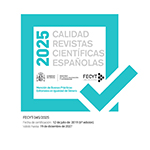Controlando el regimiento. La nobleza de Talavera de la Reina y sus métodos de intervención política en el concejo en la Baja Edad Media
Resumo
¿Cómo mantener el poder político en un concejo −Talavera de la Reina− en el que los oficios regimentales no habían sido patrimonializados? Esta cuestión, poco frecuente en las ciudades y villas castellanas bajomedievales, fue, desde la instauración del regimiento a finales del siglo XIV, uno de los principales asuntos del ámbito político a los que hubo de hacer frente la élite de poder talaverana compuesta, principalmente, por el estrato nobiliario de la villa. El objetivo de las presentes páginas es analizar la respuesta de este sector social ante la problemática que se les planteaba al no poder transmitir su cargo regimental a sus herederos. En este sentido, la estrategia seguida por la nobleza talaverana giró en torno a dos ejes, principalmente: eliminar la competencia que suponía la élite pechera en el control político del concejo y asegurar únicamente el acceso al regimiento de los miembros del estrato nobiliario. Para ello, desarrollaron un procedimiento que les garantizaba el control de los aspirantes a la regiduría vacante basado, fundamentalmente, en la votación y elección de los candidatos entre los integrantes de los linajes nobiliarios del concejo, siempre que no pertenecieran a la familia del oficial fallecido. Según este sistema, los miembros de los linajes regimentales mejor posicionados quedaban en una suerte de lista de espera, aguardando a que les llegase su turno para poder competir por el acceso a una regiduría. Como consecuencia de ello, para recabar los apoyos necesarios en este proceso, se desarrolló un complejo entramado de relaciones y alianzas sociopolíticas entre las familias del grupo dominante, cuya línea de actuación estuvo dirigida a asentar su poder político en el concejo.Downloads
##submission.format##
Licença
La revista En la España Medieval, para fomentar el intercambio global del conocimiento, facilita el acceso sin restricciones a sus contenidos desde el momento de su publicación en la presente edición electrónica, y por eso es una revista de acceso abierto. Los originales publicados en esta revista son propiedad de la Universidad Complutense de Madrid y es obligatorio citar su procedencia en cualquier reproducción total o parcial. Todos los contenidos se distribuyen bajo una licencia de uso y distribución Creative Commons Reconocimiento 4.0 (CC BY 4.0). Esta circunstancia ha de hacerse constar expresamente de esta forma cuando sea necesario. Puede consultar la versión informativa y el texto legal de la licencia.
La revista En la España Medieval no cobra por tasas por envío de trabajos, ni tampoco cuotas por la publicación de sus artículos.












